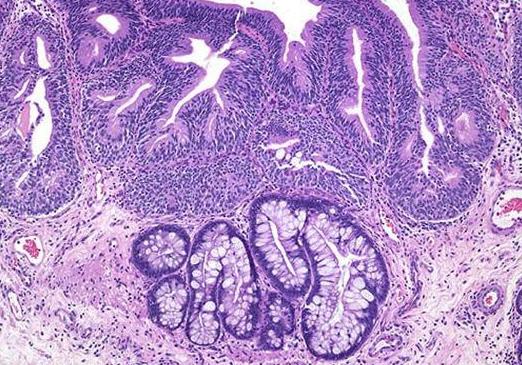Is Cystitis Glandularis a Precancerous Lesion? How to Prevent Its Canceration?
Date:2022-11-29 click:0
Cystitis glandularis is a less common cystitis. Patients are mainly manifested as repeated pain in urine, frequency of urination, hematuria, dysuria, etc., that are difficult to treat. Some patients will also be combined with perineal discomfort, abdominal swelling, urinary incontinence, pain in sexual intercourse, and a series of other symptoms. So is cystitis glandularis a precancerous lesion? How to prevent cystitis glandularis from canceration? Let's take a look at this question!

Is cystitis glandularis a precancerous lesion?
The occurrence and development of cancer is a gradual and lengthy process. In the initial stage, the human body is in a state of life and death struggle against cancer cells, and there will be many "signs" that can be judged as long as patients are careful and aware of prevention.
It is closely related to the early detection of tumors is that some benign diseases of human tissues or organs can potentially become malignant cancer. If not treated in time and left untreated for a long time, a considerable part of them will evolve into cancer. These diseases are called "precancerous lesions" or cancer in medicine.
The bladder mucosal epithelium in patients with cystitis glandularis will produce hyperplastic lesions, both hyperplasia, and metaplasia, so it is a precancerous lesion. Cystitis glandularis is mainly due to chronic irritation of the bladder mucosa, such as long-term inflammation and infection, resulting in glandular hyperplasia, blisters, and follicular changes. It is a benign lesion in itself, but it can potentially become cancerous. Clinically, adenocarcinoma is the most common occurrence of cystitis glandularis. When adenomatous hyperplasia occurs in cystitis glandularis, the possibility of a malignant change should be highly suspected, and early surgical intervention is often required.
The diagnosis of cystitis glandularis mainly depends on cystoscopy and biopsy. Based on the cystoscopy findings, it can be classified as follicular edema type, papillary neoplasia type, chronic inflammation type, and type without significant mucosal changes. The high-risk type of cystitis glandularis has the potential to become cancerous and is, therefore, a precancerous bladder lesion.
How to prevent cystitis glandularis canceration?
After patients suffering from cystitis glandularis, if the course of the disease is long enough, or the patient has not prompt intervention treatment, or if the patients let the condition develop naturally, the disease can become cancerous. So for patients, once diagnosed with cystitis glandularis, it is necessary to undergo regular treatment to prevent it from becoming cancerous.
Patients with high-risk type cystitis glandularis often need to undergo transurethral resection or electrocautery to excise the lesion and prevent its canceration. After the operation is done, bladder perfusion therapy is also required. Patients can also take herbal medicine conditioning to reduce the recurrence rate of cystitis glandularis.
The patented herbal medicine Diuretic and Anti-inflammatory Pill can be used for the consolidation of cystitis glandularis after the operation, which has a good curative effect. It can eliminate inflammation and infection, reduce the recurrence rate, and promote the recovery of the disease.
At the same time, patients also need to pay attention to the following things in daily life:
1. Patients should take care of local hygiene and maintain cleanliness. Underwear should be cleaned and replaced frequently to avoid infection and inflammation.
2. They should pay attention to health during sexual intercourse. If female patients have a vaginal injury, they should prohibit sexual life during the injury, especially during menstruation.
3. They should avoid holding urine, drink more water and urinate more, which is conducive to the recovery of bladder inflammation.
4. They should improve their diet reasonably. Avoid spicy and stimulating foods, and eat more food rich in fiber and vitamins.
Recommended Readings:



